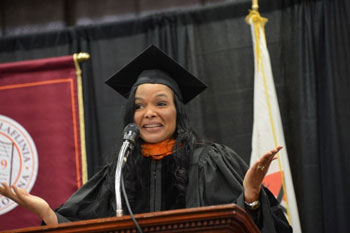Author, Entrepreneur Margarita Anderson Encourages Support of Black Businesses During Convocation Speech at Claflin University
Jan 23, 2016
Margarita (Maggie) Anderson delivered a passionate and enlightening message at Claflin University’s annual Spring Convocation on Thursday (Jan. 21), as she enthusiastically praised the virtues and legacy of Black businesses and economic empowerment in the Black community. She also challenged the audience to share the vision of past generations of Black entrepreneurs and consumers who created and supported Black businesses.
 “I am very proud of what my family and I did to support Black businesses,” said Anderson whose family lived exclusively off Black business and talent and bought only Black-made products for an entire year. “We invested about $94,000 into Black businesses which they may not have received if not for our experiment.”
“I am very proud of what my family and I did to support Black businesses,” said Anderson whose family lived exclusively off Black business and talent and bought only Black-made products for an entire year. “We invested about $94,000 into Black businesses which they may not have received if not for our experiment.”
Anderson talked about her year-long experience to a capacity crowd of students, faculty and guests in Claflin’s Tullis Arena of the Jonas T. Kennedy Health and Physical Education Building. Anderson's project was called The Empowerment Experiment (EE) and resulted in a landmark study conducted by Northwestern University’s Kellogg School of Business. Since the completion of their experiment, Anderson has become the voice of American consumers of all backgrounds who want to make sure their buying power positively impacts struggling minority communities.
“We had to endure a lot, including eating unhealthy meals, gas station food, over-priced cereal,“ Anderson said. “But it was nothing compared to the insults Black business owners had to endure when they tried to do the right thing but could not get loans or the support of Black people to sustain the economic prosperity within the Black community. Unfortunately, many of those businesses we supported during our experiment – including the only Black grocery store in Chicago – are now closed.”
Anderson wrote a critically acclaimed book, Our Black Year, presented by William Morris Entertainment and Public Affairs Books, which chronicled her experiment. She graduated from Emory University with a degree in political science. Anderson earned both juris doctor and MBA from the University of Chicago where President Barak Obama was one of her law professors. She is an accomplished business strategy professional with 17 years of legal, research, communications, and business strategy experience.
“This is what happens when you don’t know your history,” said Anderson. “The economic solidarity we had long ago is gone. We had strong schools, churches, banks, drug stores, hardware stores, hospitals and hospital systems. Hundreds of millions of dollars that stayed in those Black communities and they prospered. This led to the creation of educational institutions, civic organizations and helped to fund the civil rights movement,” Anderson added. “Booker T. Washington and Dr. Martin Luther King knew the importance of harnessing our economic power. Dr. King wanted to stage a ‘Bank-In’ when during his final speech in Memphis he asked Blacks to remove their money from the White-owned banks and deposit it in a local Black bank. Dr. King died for economic empowerment -- not racial equality.”
Anderson admitted that it was perhaps her generation – which she believes focused more on securing a good job, making money and enjoying life contributed to the demise of these institutions. They felt detached from the issues that fueled the Civil Rights Movement. They did not share the vision, commitment or willingness to preserve the Black community by supporting Black businesses. She also confessed that it was not until her mother became ill that she viewed her life differently and realized that it was time to “step up” and make a difference.
“Up until a certain time, all I wanted was a good job, lots of money to travel, spend time with my family and enjoy life,” said Anderson. “But when my mother became ill, I wanted to spend all of my time with her. She would not let me. Instead she pushed me to pursue this project which I had talked about but had all but given up on."
Her mother's death caused Anderson to refocus her priorities which led to her activism and fervent support of Black businesses. She hopes her message will inspire a new generation of visionary Black business leaders.
" It's time for us to step up-- and I am confident we will," she said. "The opportunities to start and sustain successful businesses are right here in our communities. I don't want to tell my daughters what Black communities used to look like when they could go into a store and buy something from someone who looked like them. I want them to experience that now. And I want them to see how brilliant and visionary we still are, not talk about how we used to be. It's time to claim the victory now and continue the fight."